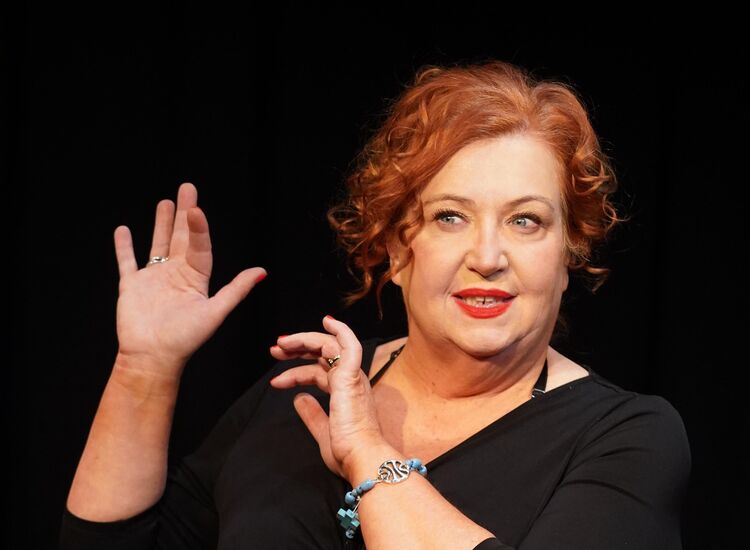Peter Johnson said his narrative is concerned in part with "'burying' what Henry James called 'ghosts of a dead society.'"
Page Turner / Edited by Peter McDermott
Peter Johnson was born to a Newport family that founded Fidelity Investments, while he is the founder of Living Folk Records and Concerts. The difference goes to the heart of the early part of his remarkable story told in “The Laughing Lesson.”
Living Folk introduced locals (and much of North America, through recordings and reviews in folksong publications) to Irish and British performers such as Margaret Barry, Mick Moloney, and fiddler Eugene O’Donnell; ballad singers Ray Fisher, Cilla Fisher and Norman Kennedy; the Watersons, the Boys of the Lough, the High Level Ranters, De Dannan, Peter Bellamy, the Battlefield Band, Frankie Armstrong, Louis Killen, Dave Swarbrick, Martin Carthy and many others. His new memoir, “The Laughing Lesson,” chronicles his experiences as a singer, concert promoter, record producer, writer, traveler, prankster, son, husband, father, and as a fixture of the Cambridge music scene for the last 50 years.
Johnson told the Echo: “It’s largely about coming to terms with my childhood and how I found my own path in the traditional folk music world. It’s about ‘burying’ what Henry James called ‘ghosts of a dead society. Emily Dickinson said, ‘Vanished is the American gentlemen, and the conditions that produced him.’
“Some of my book is about my music, traveling to the British Isles and meeting musicians and collecting songs. My involvement with the theatre is chronicled as well. The Loeb Theatre, in Cambridge, was where I acted. I got into two movies, The Boston ‘Strangler’ with Tony Curtis, and ‘Charley’ with Claire Bloom.

When asked for a Q & A with his publisher about the “‘Blue Blood’ world of Newport ‘royalty’ and the very much down-stairs world of the do-it-yourself Folk Music Revival,” he said: “I think in those days’ parents didn’t know what to do with their children, I was left out a lot as a child. I felt I wasn’t included in their world, as little boys should be seen and not heard. One time my father was standing near our port cochere, looking at the gardeners cutting the lawn, and he said, ‘My boy someday this will be yours.’ Shortly after, I was locked out of the house from a night at the movies with my friends and I had to spend the night sleeping in the horse stall. How can I be master of what I am going to inherit when I am locked out of my own house?”
Johnson continued: “I was actually first exposed to folk music when I was very young. I would hear Nora, our cook from Galway, in Ireland, sing these sad, lovely songs and I associated these songs with her love for me.
“I heard some French folk songs when I lived in France, and it expanded my interest in folk music. I learned that all nationalities had folk songs, and it didn’t just come from England and Ireland. This helped expand my cultural awareness.”
Brian O'Donovan of “A Celtic Soujourn” on WGBH Radio said: "Since first arriving in Boston in 1981, Peter Johnson was for me an important part of the zeitgeist of the city."
As for the book, O’Donovan commented: “In ‘The Laughing Lesson,’ Peter perfectly and often hilariously describes the bifurcated world he occupied, juxtaposing often absurd Brahmin formality with his endless variety of colorful characters in a ragamuffin Cambridge. At times, when reading it, I felt I was in the Plough and the Stars having a pint with all of them.”
Dave Palmetar, the announcer of “Downeast Ceilidh” on WUMB Radio added: "A story of transformation, as Peter goes from a child of Newport privilege to Cambridge bohemian in literally a turkey suit to become a champion and tireless promoter of folk music."
Said Heather Wood, The Young Tradition, Program Director, of the Folk Music Society of New York, Inc.: "His encouragement and support have introduced many musicians, singers, and bands to wider audiences....knowing that if Peter was involved, the music would be worth listening to."
Peter Johnson
Date of birth: May 2, 1935
Place of birth: Newport, R.I.
Spouse: Lorna Johnson
Children: P.J. Johnson III
Residence: Boston, Mass.
Published works: “The Laughing Lesson: A Memoir by the Founder of Living Folk Records and Concerts.”
What is your writing routine? Are there ideal conditions?
I don’t have any set conditions. There’s so much to do during the day that I can’t set aside a specific period of time to write. I try to write in the evening, before I go to bed, when I can collect my thoughts and I don’t have to worry about doing other things. I find that that is the best time to focus.
What advice do you have for aspiring writers?
I wrote my book, but, in some sense, the book was written by many hands. The people that I met along the way, who influenced me, contributed in some way to the project. Writing what you know and being open to the influences of others can help you find your story.
Name three books that are memorable in terms of your reading pleasure.
Mark Twain, “The Adventures of Huckleberry Finn” and “The Adventures of Tom Sawyer”; Edith Wharton, The Age of Innocence; Howard Zinn, “A People’s History of the United States.”
What book are you currently reading?
Bertrand Russell’s “History of Western Philosophy”; Emily Dickinson’s poetry; Margaret Fuller’s transcendental poetry.
Is there a book you wish you had written?
I’m not really sure, because I was so involved with writing my own memoir. What I have written encompasses a bit of a memoir and a bit of an autobiography. I’m happy with having written my own book. I’m so glad it’s finally finished. I was so committed to and fulfilled by this project that I didn’t have time to worry about what I might have made in its stead.
Name a book that you were pleasantly surprised by.
Margaret Meade’s “Coming of Age in Samoa.” This book emphasizes the role of social convention rather than biology in shaping human behavior, which is an extension of the classic nature versus nurture debate.
If you could meet one author, living or dead, who would it be?
Richard M. Dorson, who wrote “Folklore and Fakelore” or Margaret Mead, the anthropologist, who wrote “Coming of Age in Samoa.”
What book changed your life?
I’m not sure if there’s any one book, because there were different writers over time that leavened my sensibilities, but Bertrand Russell’s “History of Western Philosophy,” which was probably the most famous philosophy book of its time, has had quite an impact.
What is your favorite spot in Ireland?
The Western part, where they speak Gaelic, and also the Hebrides in Scotland. The people who migrated to Scotland were originally Irish and so their languages are still quite similar, as they share the same Gaelic roots. Both of these areas are quite beautiful.








